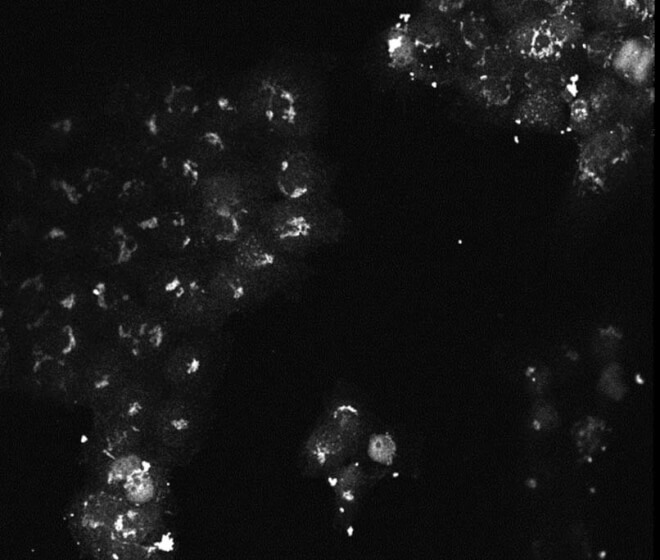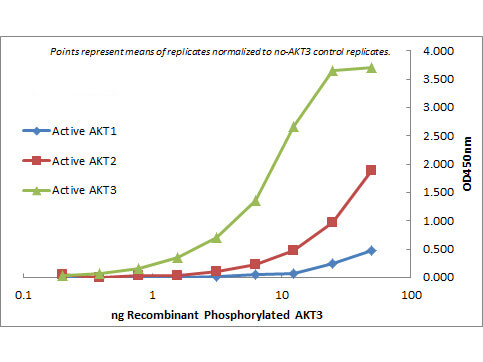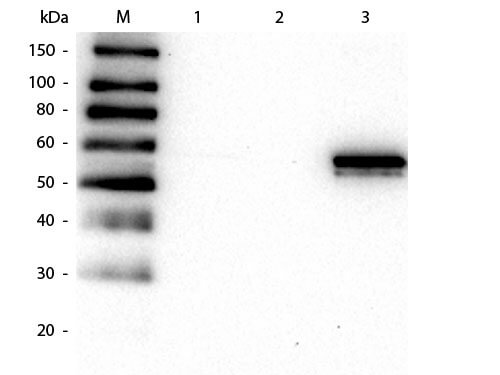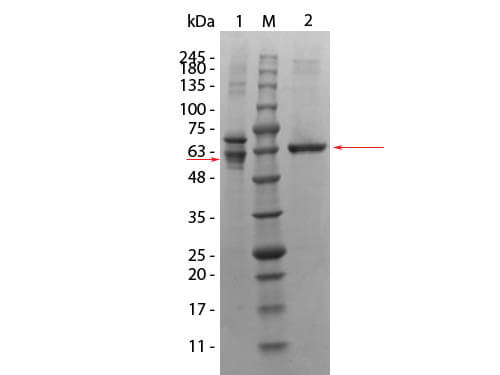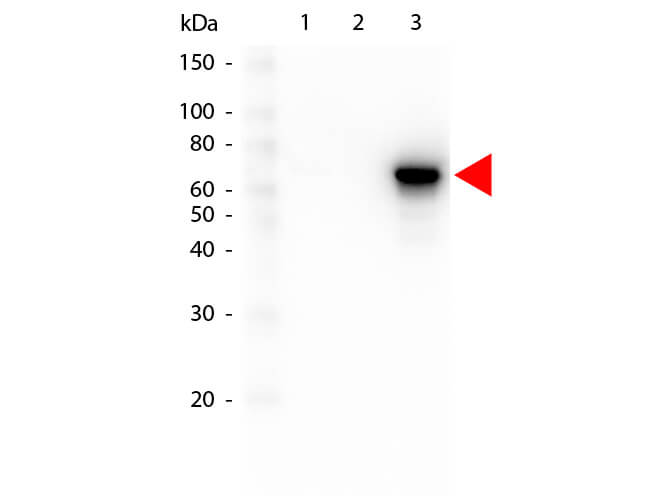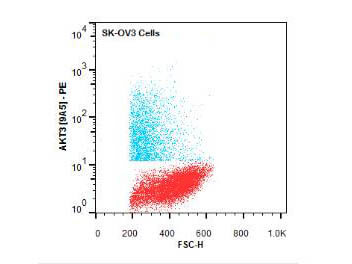Datasheet is currently unavailable. Try again or CONTACT US
AKT3 Antibody Combo Pack
Mouse Monoclonal 9A5.H9.G7 IgG1 kappa
K-J36
1 Pack
Liquid and Lyophilized
WB, ELISA, IF
Human
Mouse
Shipping info:
$50.00 to US & $70.00 to Canada for most products. Final costs are calculated at checkout.
Product Details
AKT3 Antibody Combo Pack - K-J36
AKT 3 antibody pair, AKT-3, PKB antibody, PKB gamma antibody, PKBGAMMA antibody, PRKBG antibody, Protein kinase Akt 3 antibody, Protein kinase B gamma antibody, RAC-gamma serine/threonine-protein kinase, RAC-PK-gamma, primary and secondary antibody pair, Primary+Secondary pair, matched antibody pair
Mouse
Monoclonal
IgG1
Combo Pack
Target Details
AKT3 - View All AKT3 Products
Human
Conjugated Peptide
Anti-AKT3 Antibody was produced in mice by repeated immunizations with a synthetic peptide corresponding to internal residues of human AKT3 protein. Anti-Mouse IgG HRP secondary antibody was produced by repeated immunizations in rabbit with Mouse IgG whole molecule.
This AKT3 primary and secondary antibody pair has been carefully chosen to give best results. Anti-AKT3 antibody is directed against human AKT3. The antibody detects both unphosphorylated and phosphorylated forms of the protein. Anti-AKT3 antibody was purified from ascites by Protein A chromatography. Cross reactivity with AKT3 from other species has not been determined, however, the sequence of the immunogen shows 100% identity to human, mouse, and rat, therefore, cross reactivity is expected. Cross-reactivity with AKT2 and AKT1 has not been determined. HRP secondary antibody was prepared from monospecific antiserum by immunoaffinity chromatography using Mouse IgG coupled to agarose beads followed by solid phase adsorption(s) to remove any unwanted reactivities. This product shows balanced reactivity to Mouse IgG1, IgG2a, IgG2b and IgG3 proteins and is suitable to screen IgG class hybridoma clones. Minimal cross reactivity is observed against other Mouse immunoglobulin classes or light chain proteins. This antibody pair is sufficient for up to 5 mini blots at 7.5 x 8 cm2 (1,800 cm2).
Application Details
ELISA, IF, WB
Anti-AKT3 Antibody with the matched secondary are suitable for ELISA, immunohistochemistry, and western blotting. Expect a band approximately 56 kDa in size corresponding to AKT3 protein by western blotting in the appropriate cell lysate or extract. This monoclonal antibody reacts with human AKT. Specific conditions for reactivity should be optimized by the end user. For immunohistochemistry we recommend the use of fresh frozen tissues. Attempts at staining paraffin-embedded formalin fixed tissues were negative. No pre-treatment of sample is required.
Formulation
1 mg/mL by UV absorbance at 280 nm
0.02 M Potassium Phosphate, 0.15 M Sodium Chloride, pH 7.2
0.01% (w/v) Sodium Azide
None
1.0 mL
Restore with deionized water (or equivalent)
Shipping & Handling
Dry Ice
Primary antibody: the vial contains a relatively low volume of reagent (25 µL). Store vial at -20° C or below prior to opening. To minimize loss of volume dilute 1:10 by adding 225 µL of the buffer stated above directly to the vial. Recap, mix thoroughly and briefly centrifuge to collect the volume at the bottom of the vial. Use this intermediate dilution when calculating final dilutions as recommended below. Store the vial at -20°C or below after dilution. Avoid cycles of freezing and thawing. Secondary antibody: Store secondary antibody at 4° C prior to restoration. For extended storage aliquot antibody and freeze at -20° C or below. Avoid cycles of freezing and thawing. Centrifuge product if not completely clear after standing at room temperature. Anti-Mouse IgG HRP secondary antibody is stable for several weeks at 4° C as an undiluted liquid. Dilute only prior to immediate use.
Expiration date is one (1) year from date of receipt.
This AKT3 Antibody Combo Pack contains: Mouse Anti-AKT3 and Rabbit Anti-Mouse IgG1, 2a, 2b, 3 HRP antibody. AKT3 Antibody detects AKT3 which is a component of the PI-3 kinase pathway and is activated by phosphorylation at Ser 473 and Thr 308. AKT is a cytoplasmic protein also known as Protein Kinase B (PKB) and rac (related to A and C kinases). AKT is a key regulator of many signal transduction pathways. AKT Exhibits tight control over cell proliferation and cell viability. Overexpression or inappropriate activation of AKT is noted in many types of cancer. AKT mediates many of the downstream events of PI 3-kinase (a lipid kinase activated by growth factors, cytokines and insulin). PI 3-kinase recruits AKT to the membrane, where it is activated by PDK1 phosphorylation. Once phosphorylated, AKT dissociates from the membrane and phosphorylates targets in the cytoplasm and the cell nucleus. AKT has two main roles: (i) inhibition of apoptosis; (ii) promotion of proliferation. Anti-AKT3 Antibody is ideal for investigators involved in Cell Signaling, Neuroscience and Signal Transduction research.
This product is for research use only and is not intended for therapeutic or diagnostic applications. Please contact a technical service representative for more information. All products of animal origin manufactured by Rockland Immunochemicals are derived from starting materials of North American origin. Collection was performed in United States Department of Agriculture (USDA) inspected facilities and all materials have been inspected and certified to be free of disease and suitable for exportation. All properties listed are typical characteristics and are not specifications. All suggestions and data are offered in good faith but without guarantee as conditions and methods of use of our products are beyond our control. All claims must be made within 30 days following the date of delivery. The prospective user must determine the suitability of our materials before adopting them on a commercial scale. Suggested uses of our products are not recommendations to use our products in violation of any patent or as a license under any patent of Rockland Immunochemicals, Inc. If you require a commercial license to use this material and do not have one, then return this material, unopened to: Rockland Inc., P.O. BOX 5199, Limerick, Pennsylvania, USA.

